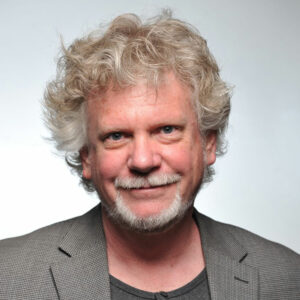Brigitte Haentjens
Laureate, 2007
Image: Name, Title, Description
01
2007 Laureate
In selecting Brigitte Haentjens as the recipient of the 2006 Siminovitch Prize in Theatre, the Jury wanted to recognize the prodigious virtuosity of her “écriture scénique” [her work as a director/creator], as well as the profoundly human character of her mission “In Brigitte’s world, ideas bleed, bodies think, space throbs. This is écriture scénique that defies classification; that displays a breathtaking tension between meticulousness and brutality; and wherein people, even as they are excited and inspired by the show itself, will find themselves forced to question the very foundations of their existence, of their identity, without any possible escape.”
Ms. Haentjens studied theatre in Paris before moving to Ontario in 1977, serving as artistic director of the Théâtre du Nouvel-Ontario for eight years. From 1991 to 1994 she was artistic director of Nouvelle Compagnie Théâtrale in Montréal, and from 1996 to 2006 she was artistic co-director for the Carrefour International de Théâtre de Québec. Ms. Haentjens has also run her own theatre company, Sibyllines, since 1997, intended as a vehicle to further explore her artistic approach with greater freedom. She is currently working at Sibyllines on a French production of Blasté by Sarah Kane, translated by Jean Marc Dalpé and starring Paul Ahmarani, Céline Bonnier and Roy Dupuis, scheduled to open in the spring of 2008.
Acceptance Speech
First of all, permit me to express my profound gratitude to the founders of the Siminovitch Prize. Thank you, Lou – and thanks as well to the late Elinore Siminovitch. Your work inspired this prize which is so unique, so generous, and so prestigious.
Thanks to BMO Financial Group for supporting this prize, and to its employees for organizing this evening. A very special thank to Andrew Soren.
All my gratitude to the members of the jury: Leonard McHardy, Geneviève Billette, Katrina Dunn, Valerie Moore, and Carlo Guillermo Proto. A very special thank-you to Carlo Guillermo Proto and Geneviève Billette who worked very hard to produce the video that you just saw.
I would like of course to thank Paul Lefebvre, who presented my nomination, and did it in such an eloquent and generous fashion.
Finally, permit me to thank my companion Stéphan, who over the last fifteen years has so often shown me love, support, and encouragement. Without his company, his pride in my work, and his encouragement in difficult moments, I probably wouldn’t be here tonight.
When they told me that I was the winner, I couldn’t sleep for a week!
This prize truly means an enormous amount to me.
It honours me and it honours all the communities that have given me love and support over the last thirty years of artistic work: the Franco-Ontarian community of course — those of Ottawa, Hawkesbury, Rockland, Timmins, Hearst and of course that of Sudbury, and more particularly the one that surrounds Théâtre du Nouvel-Ontario; but also the community of Toronto, where we played Le Chien in English. The French-Canadian community, within which I have so often been active.
And finally, the communities of Montreal, of Quebec City, and of Quebec in general.
I dedicate this prize to them, and to all those who, like all of you here this evening, believe that art — if it doesn’t change the world — at least relieves the deafening silence of solitude.
As far back as I can remember, theatre has been a part of my life.
In the audience, as a child, I had the good fortune to experience certain powerful aesthetic shocks. I remember the one occasioned by the Marat-Sade that Peter Brook directed in 1963: the show, which I probably didn’t understand, struck me as hard as a whip all the same. I also remember Ariane Mnouchkine’s 1789, which made me float on a little burning cloud for weeks.
Since then, I can’t count the strong emotions that I have experienced while sitting in a theatre, here or elsewhere.
Theatre has the effect on me of a cut, of a burn, of a punch, of a lash. Theatre stimulates me, upsets me, and can even enrage me.
Theatre has always given me the desire to live, to create, to stand up and fight.
In short, theatre inspires every feeling in me except that of comfort.
Since childhood, I have belonged to amateur, school, and community theatre groups. And yet, I never imagined myself directing. In fact, when I was young I didn’t know that directing could be a job!
(And even today, I sometimes doubt that it is one!)
In the family environment in which I grew up – my parents had received only a cursory education – there could be no question of an artistic or intellectual life. Moreover, I belong to one of the first generations of women who had access to higher education.
In the era in which I entered university, I had before me almost no models of women choosing a career, never mind an artistic career.
To make theatre for a (more or less successful) living – to define oneself as an artist – thus seemed to me both completely mysterious, and totally unattainable.
In fact, thanks surely to wonderful teachers who understood how to share their passion for words, I was awakened very early to literature, and my secret adolescent fantasy might have been to become Simone de Beauvoir: for her books, her intelligence… and maybe also for her crimson nails, her cigarettes, and her relationships with Jean-Paul Sartre and St-Germain-des-Prés!
It may be that even then, it was the necessity of speaking that motivated me. In any case, words and ideas were the substrata of my artistic life.
The words of writers and poets: from William Faulkner to Antonin Artaud, from Flannery O’Connor to Krista Wolf, from Marcel Proust to Carson McCullers, from Sylvia Plath to Margaret Atwood, from Ingeborg Bachmann to Michael Ondatje, from Jean Marc Dalpé to Louise Dupré.These words – and those of playwrights, of course. But when I make theatre, I turn first of all to literature and poetry.
I don’t remember at all how I found myself at the Ecole de théâtre Jacques Lecoq. It was relatively late: I was already almost 25, and had my university studies behind me…
I don’t know what I was looking for there. In any case, certainly not to make a career, in the traditional sense of the word.
I hadn’t imagined my future after school, either. Nor that I would have to leave my country of origin in order that theatre could become my whole life.
The shock represented for me by my first contact with the Franco-Ontarian artistic community was immense. At that time (1977-), theatre was intimately linked with a wide-ranging societal project. It was linked to a collective desire to speak.
We had the impression that the sky was wide open before us, and in the words of the poet Robert Dickson (who was taken from us much too soon), our landscape was the one from his poem:
In the north of our lives
Here
Where distance wears down hearts full
of the mineral tenderness of the
land of stone, forests and cold
We
stubborn, underground and together
let fly our rough and rocky cries
to the four winds of the possible future
It was about speaking; giving a voice to those who didn’t have one; putting characters onstage who belonged to the race of the forgotten. It was about naming the country, the people, giving them pride and confidence.
We spent an enormous amount of time in the working-class communities of Hawkesbury and Sudbury, meeting textile workers and miners, listening to their stories, in order to write them down and put them onstage.
I directed the stories that we were writing, but I did it a bit by default, as no one else wanted to do it. What was important to me at the time, and still is, was the simple need to speak;to express a world; and to share it with someone… with some… well, with the audience.
Now, of course, we are no longer in a period where it seems indispensable to name ourselves and to put ourselves onstage as a community. Since that time, I have brought to the stage many texts of very diverse origins, from Camus to Beckett, from Feydeau to Koltès. I have worked in many theatres, large and small.
Since that time, I have left Ontario, for Montreal; Théâtre du Nouvel-Ontario, for the Nouvelle Compagnie Théâtrale (NCT); and institutions, for liberty.
I founded the company Sibyllines ten years ago in order to bring to the stage contemporary works of a theatrical or literary nature, and to make other voices heard. In order to do so in the best possible artistic conditions. The quality of the process of creation is, it seems to me, as fundamental as its result.
Over the years, and (perhaps to an even greater extent) in the context of the liberty that Sibyllines permits me, directing has thus become for me a form of writing. Through the words of others, or through the silences that are left to me.
Today, I love more than anything to make silence be heard. The silence of writers who paid with their lives for their violent combat with words: Sylvia Plath, Ingeborg Bachmann, Virginia Woolf.
The silence between words; that of bodies. The silence of powerlessness; the silence of violence.
Actually it seems to me that theatre is, in a completely paradoxical way, as much a place of silence as of speech. One of the only places where you can still think as a community.
After thirty years of active work, directing always seems to me to be an enormous privilege. A privilege to promote the circulation, in the collective imagination, of words and signs that will perhaps open the hearts of the audience, and perhaps give them cause to reflect on the world in which we live.
A privilege to have such a fruitful and enriching relationship with the audience.
A privilege to find myself in a rehearsal room surrounded by books, scripts, actors, and designers, in an incredibly intense atmosphere of sharing and of solidarity. To have the pleasure of discussing, of delving into the scripts, of searching for the best way to represent them onstage. To spend hours with the actors searching for the best gesture, the best movement.
Permit me to salute here all the artisans, designers, and actors who have shared my road for the last thirty years, and particularly for the last ten years. All those who have put their talent, their energy, and their openness into the service of the works and the projects, with complete confidence and complete abandon.
But this privilege and this liberty have come at a price: and it is, I won’t deny it, a high price. We live in a country where art is disappearing from public and governmental priorities. We live in a country that sometimes copies its workings and its concerns from those of its great neighbour, and that abandons its responsibilities for the development and support of artists to the laws of the market or to the vagaries of private sponsorship.
In this country, very few individuals can live from their art, and of course only a few can live from directing. In order to devote myself exclusively to the theatre, I, like many others, had to make choices, among which were to run a company, to take on numerous responsibilities alone, from writing press releases to accounting, fundraising, and other activities, each one more creative than the last.
Faced with the amount of work I need to accomplish in order to properly carry out the projects that I take on; faced with the price to be paid for the privilege of being a director who chooses her own adventures – sometimes I feel discouraged and exhausted. Sometimes, also, I feel like I can’t breathe.
A prize like the Siminovitch Prize is a wonderful stimulant, a wonderful encouragement, both symbolic and material. Perhaps this encouragement is even more intense when it arrives in the middle part of your life, at the moment when you are mature and in full possession of your artistic means.
Let us hope that the provincial and federal governments uphold their responsibilities as much as generous donors like yourselves do.
It’s our job – all of us – to demand a fair place for art, for theatre, for writing, for dramaturgy, for creation, so that we as a community can sustain our hope of a society that is more just and more human, more mutually supportive, more open, and more intelligent.
One of the marvellous aspects of the Siminovitch Prize is the possibility of supporting individuals or groups in order to salute their talent. This opportunity is even more important given that this period is particularly perilous for all emerging talents. Today, access to resources for young creators is, in large measure, out of reach.
It’s extraordinary to be able to play fairy godmother!! So I have the pleasure to present to you my laureates. I have chosen two of them, full of talent and energy.
First of all: Francis Monty, Olivier Ducas, and David Lavoie, who for years now have been running a company called La Pire Espèce, dedicated to théâtre d’objets ; a theatre that is inventive, playful, and extraordinarily infectious. La Pire Espèce puts words at the heart of its approach. They are a talented, brilliant, and incredibly dynamic company. Unfortunately, they are currently on tour in France!
My second protégé is Christian Lapointe. He is a creator originally from Quebec; he studied directing at the National Theatre School; and it was at this time, while serving as his mentor, that I discovered his talent, his intelligence, his rigour, and his pugnacity. He thereafter founded the company for which he so successfully writes, directs, and acts. He devotes himself completely to his art, and he does it with brio to spare. Ladies and gentlemen, I have the pleasure of introducing to you, Christian Lapointe.
2007 Protégé
02
Simi News
Subscribe today to the monthly e-newsletter.
> Be the first to know about current artistic projects of the Siminovitch Prize community.
> Learn about emerging artists who are shaping the future of Canadian theatre.
> Stay informed about upcoming opportunities and calls for nominations.




